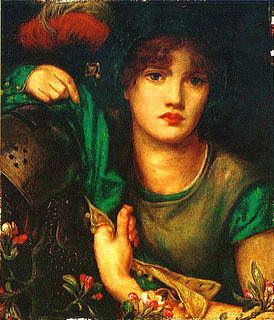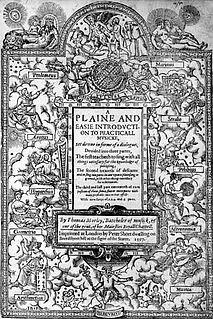Related Research Articles

John Dowland was an English or possibly Irish Renaissance composer, lutenist, and singer. He is best known today for his melancholy songs such as "Come, heavy sleep", "Come again", "Flow my tears", "I saw my Lady weepe" and "In darkness let me dwell", but his instrumental music has undergone a major revival, and with the 20th century's early music revival, has been a continuing source of repertoire for lutenists and classical guitarists.

"Barbara Allen" is a traditional folk song once popular throughout the English speaking world. It tells how the eponymous character denies a dying man's love then dies of grief soon after his untimely death.

"Greensleeves" is a traditional English folk song. A broadside ballad by the name "A Newe Northen Dittye of ye Ladye Greene Sleves" was registered by Richard Jones at the London Stationer's Company in September 1580, and the tune is found in several late-16th-century and early-17th-century sources, such as Ballet's MS Lute Book and Het Luitboek van Thysius, as well as various manuscripts preserved in the Seeley Historical Library in the University of Cambridge.
Thomas Robinson was an English Renaissance composer and music teacher, who flourished around 1600. He taught and wrote music for lute, cittern, orpharion, bandora, viol, and voice.

The Fitzwilliam Virginal Book is a primary source of keyboard music from the late Elizabethan and early Jacobean periods in England, i.e., the late Renaissance and very early Baroque. It takes its name from Viscount Fitzwilliam who bequeathed this manuscript collection to Cambridge University in 1816. It is now housed in the Fitzwilliam Museum at Cambridge. The word virginals does not necessarily denote any specific instrument and might refer to anything with a keyboard.

Thomas Morley was an English composer, theorist, singer and organist of the Renaissance. He was one of the foremost members of the English Madrigal School. Referring to the strong Italian influence on the English madrigal, The New Grove Dictionary of Music and Musicians states that Morley was "chiefly responsible for grafting the Italian shoot on to the native stock and initiating the curiously brief but brilliant flowering of the madrigal that constitutes one of the most colourful episodes in the history of English music."

Anthony [Antony] Holborne [Holburne] was a composer of music for lute, cittern, and instrumental consort during the reign of Queen Elizabeth I.

During the reign of Queen Elizabeth I (1558–1603), English art and high culture reached a pinnacle known as the height of the English Renaissance. Elizabethan music experienced a shift in popularity from sacred to secular music and the rise of instrumental music. Professional musicians were employed by the Church of England, the nobility, and the rising middle-class.

Paul R. O'Dette is an American lutenist, conductor, and musicologist specializing in early music.
"I Saw My Lady Weepe" is a lute song from The Second Book of Songs by Renaissance lutenist and composer John Dowland. It is the first song in the Second Book and is dedicated to Anthony Holborne. It is an example of Dowland's use of chromaticism.

"Come Again, sweet love doth now invite" is a song by John Dowland. The lyrics are anonymous. The song is bitter-sweet, typical of Dowland who cultivated a melancholy style.
"Six Dukes Went a-Fishing" is a traditional English folk ballad.
The Dublin Virginal Manuscript is an important anthology of keyboard music kept in the library of Trinity College, Dublin, where it has been since the 17th century under the present shelf-list TCD Ms D.3.29.

Walsingham was a popular Elizabethan ballad tune. There are various versions of the lyrics, which relate to a pilgrimage site, suppressed during the English Reformation.
"Will Yow Walke the Woods soe Wylde" is the title of a song from the Tudor era, popularly believed to have been a favourite of Henry VIII. The complete text of the song has not survived, but contained the short refrain:
"The Carman's Whistle" is a song of the Tudor era. The title refers to the occupation of "carman". Carmen were known for their habit of whistling, which according to William Chappell was effective in the management of horses. Risqué lyrics have survived including a version entitled "The Courteous Carman and the Amorous maid: Or, The Carman's Whistle".
The Huntes upp is a sixteenth century ballad attributed to William Gray.

"Can She Excuse My Wrongs" is a late 16th-century song by the English Renaissance composer John Dowland, the fifth song in his First Booke of Songes or Ayres. The words are set to a dance-tune, a galliard.
Packington's Pound is an English Broadside ballad that dates back, roughly, to the last quarter of the 16th century. It is most recognized by its tune, and, in fact, more tunes were set to "Packington's Pound" than ballads named "Packington's Pound." Claude Simpson in "The British Broadside Ballad and its Music" writes: "This [Packington's Pound] is the most popular single tune associated with ballads before 1700." Extant copies of the ballad can be found at the Huntington Library, the Pepys Library,and the National Library of Scotland.

The Hermit is the 1976 solo album by British folk musician John Renbourn. On this release, Renbourn drew from lute and harp sources, and pieces from Turlough O'Carolan such as O'Carolan's Concerto transcribed for guitar.
References
- 1 2 3 4 Chappell, William (1893). Old English Popular Music: Vol 1 (Second ed.). London: Chappell and MacMillan. p. 153.
- ↑ Anders, H.R.D (1904). Shakespeare's Books. Berlin: Publisher & Printer Georg Reimer. p. 178.
- ↑ Morris, Harry (December 1958). "Ophelia's "Bonny Sweet Robin"". Publications of the Modern Language Association of America. 73 (5): 601–603. doi:10.2307/460304. JSTOR 460304.
- ↑ Fitzwilliam Virginal Book. Leipzig: Breitkopf & Härtel. 1899.
- 1 2 Poulton, Diana (1982). John Dowland. University of California Press. p. 173.
- ↑ Grainger, Percy (1912). My Robin is to the Greenwood Gone. London: Schott & Co.